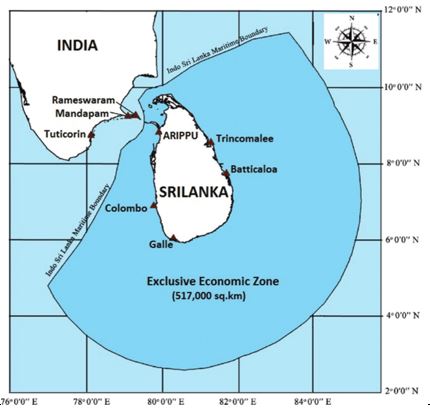

Context
The ban on Chinese ships in Sri Lanka’s exclusive economic zone (EEZ) has become a point of discussion at the global level.
What has happened?
- Sri Lanka recently announced that it would not allow any Chinese research vessels to dock at its ports or operate within its EEZ for a year.
- The move came after Indian Prime Minister Narendra Modiurged Sri Lanka President to respect New Delhi’s strategic and security concerns.
- India had earlier raised objections to Chinese research vessel Shi Yan 6, which had conducted a joint maritime survey in October to November with the Sri Lankan maritime agency.
- India and also the United States had often expressed displeasure to Sri Lanka on the increasing presence of Chinese combat and research vessels in the Indian Ocean, that occasionally anchor on Sri Lankan ports.
|
Sri Lanka’s Exclusive Economic Zone (EEZ)
|
India-China clash on Sri Lanka
- For years, India and Chinahave vied for influence in Sri Lanka and across the wider Indian Ocean, with Delhi viewing the sea lanes as vital to defending its southernmost regions.
- Amid strained ties with India over a border clashin 2020, China’s expanding interests in the Indian Ocean include growing diplomatic and trade ties.
China’s expanding interests in the Indian Ocean
- In 2008 and 2014, Beijing had deployed its navy and submarines respectively in the Gulf of Adenin support of its anti-piracy operations.
- In 2017, China established its first ever overseas military facility in the Indian Ocean, in Djiboutiin the Horn of Africa.
- Last November, Sri Lanka gave the green light to China’s energy giant, Sinopec, to establish a new petroleum refinery plant in Hambantota, the town that also houses the deep water port that was leased to China in 2017 after Colombo defaulted on debt payments.
Why does India object to Chinese vessels docking in Sri Lanka?
- Security threats: India considers Chinese ships docked so close to its mainland a security threat, and suspects they could be used for snooping, even when their stated aim is scientific research.
Why is China’s Presence in Sri Lanka a Concern for India?
- China’s Debt strategy: Recently, China's presence in Sri Lanka has increased on a large scale.
- China is the largest bilateral creditor to Sri Lanka.
- Its loans to the Sri Lankan public sector amount to 15% of the central government’s external debt.
- Sri Lanka heavily relies on Chinese credit to address its foreign debt burden.
- Investment on Infrastructure: China extended about USD 2.8 billion to Sri Lankasoon after the pandemic hit but has not stepped in much in 2022, even as the island’s economy collapsed rapidly.
- China has invested about USD 12 billion in Sri Lanka’s infrastructure projects between 2006-19.
- Relations with Island countries: China enjoys friendlier waters in South Asia and the Indian Ocean than it does in Southeast Asia and the Pacific.
- China faces opposition from Taiwan, territorial disputes in the South China Sea and East Asia, and myriad frictions with the US and Australia.



